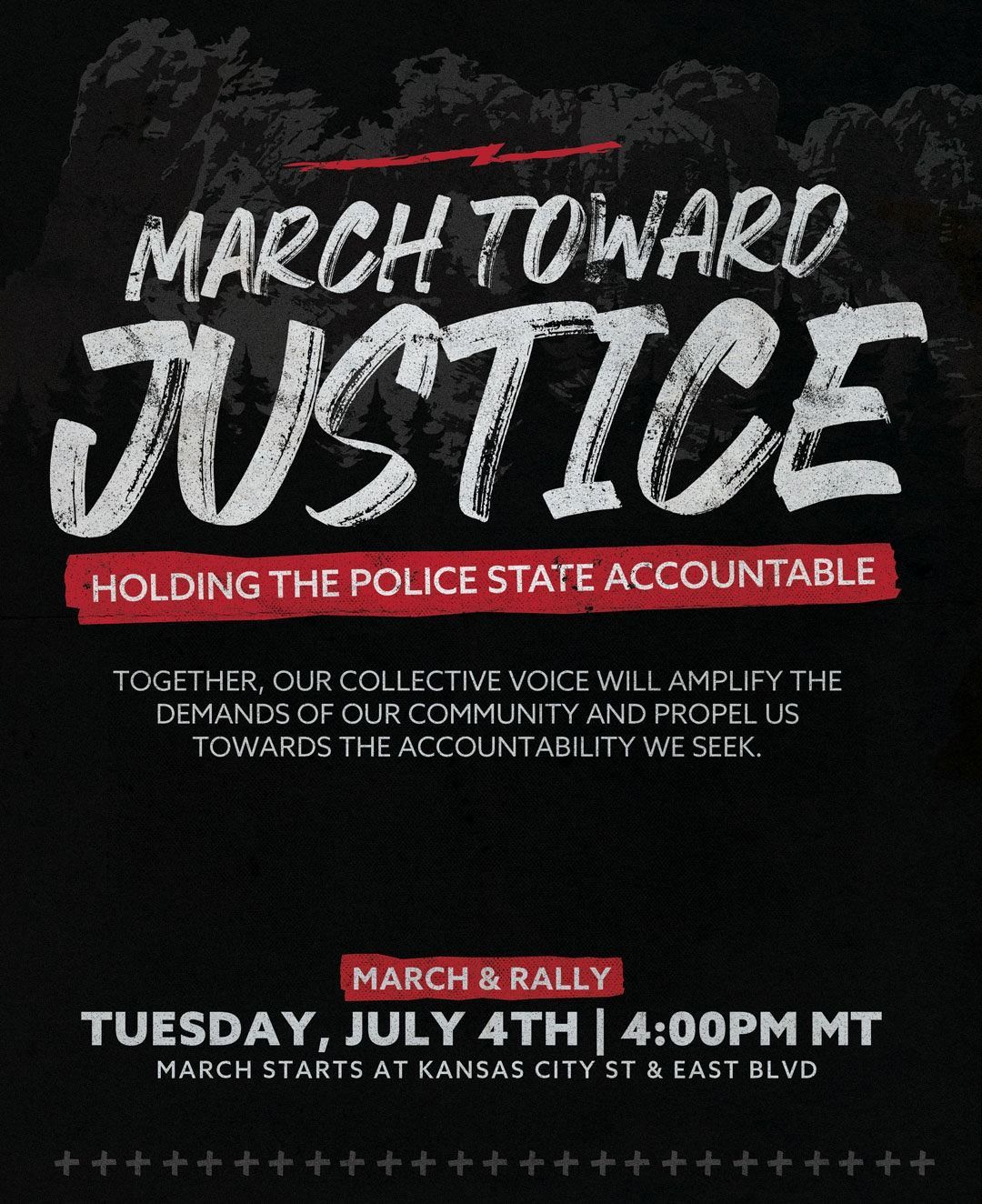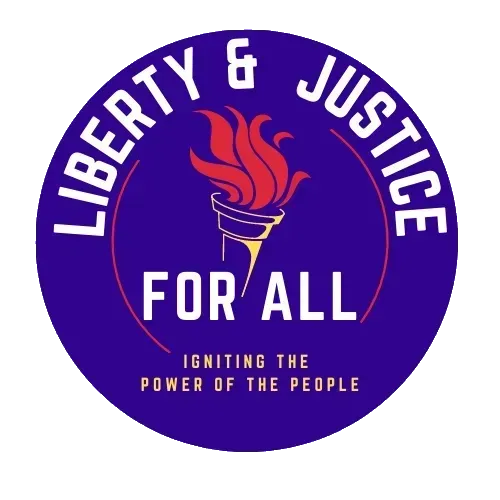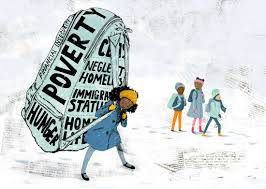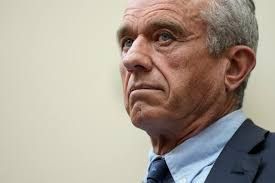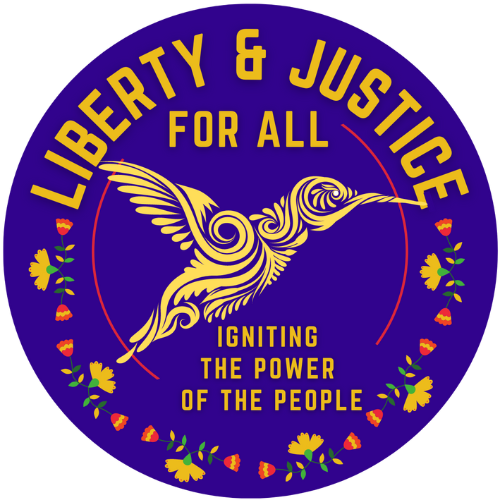1776 Declaration of Independence - The March Toward Justice
Fight Today For a Better Tomorrow -
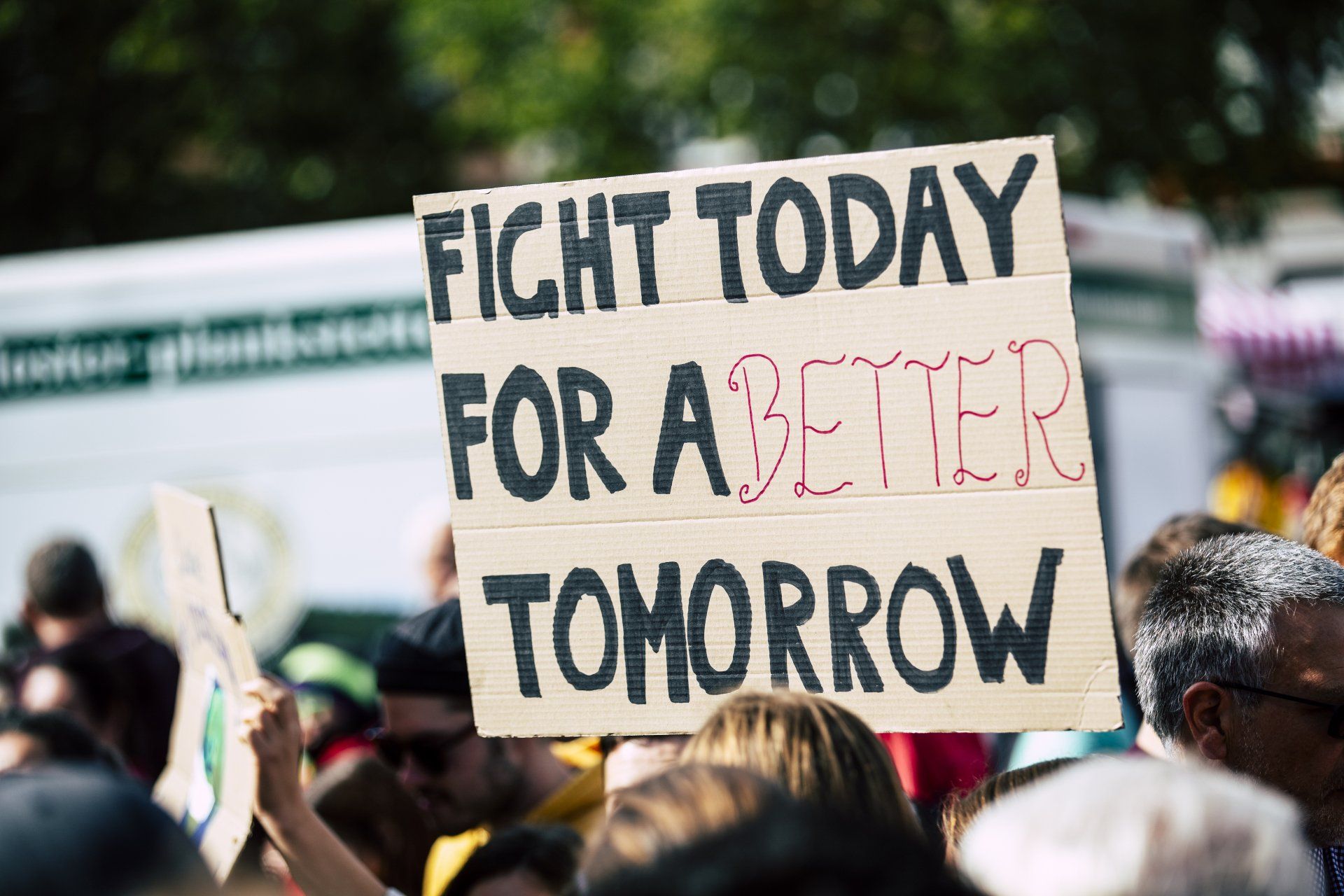
Today a diverse and inclusive community will gather in the March Toward Justice to bring attention to the need for justice in our community. In the last few weeks we have witnessed the fear ridden actions from the Rapid City Mayor(s) with their blustery "public safety warning" to "stay off the streets", to the erection of the signs "Thank you to all our law enforcement who keep us safe" purchased by the new mayors PAC SD Strong and now the arrest of Nick Tilsen the CEO of NDN Collective. All of these “actions” are from an old and outdated play book harking back to days gone by. All of these action are attempts to vilify the Native American community for choosing to stand strong and demand justice in a community that has been marked by racism from the beginning.
Affirming rights and standing for justice has never been without conflict and will never be comfortable.
100 hundred years ago women were "given" the right to vote. Only 45 years ago were First Nations People "allowed" religious practice without persecution. Only 8 years ago were same couples "allowed" to legally marry. In 1776, The Declaration of Independence proclaimed "all men are created equal" and asserted certain inalienable rights, such as life, liberty, and the pursuit of happiness. However, these rights were initially limited to white male property owners.
During and after the signing of the Declaration of Independence, various forms of oppression and discrimination persisted. Women, Native Americans, and enslaved Africans were excluded from the political process and denied basic rights, including the right to vote. From 1774 until about 1832, treaties between individual sovereign American Indian nations and the United States were negotiated to establish borders and prescribe conditions of behavior between the parties.
The form of these agreements was nearly identical to the Treaty of Paris ending the Revolutionary War between the U.S. and Great Britain. The negotiations ended in a mutually signed pact that had to be approved by the U.S. Congress. Non-tribal citizens were required to have a passport to cross sovereign Indian lands.
1778–1829 The new United States continued the Colonial-era practice of signing treaties with tribes to maintain peace between nations. But thirst for Native American land proved stronger than Government promises. Native Americans called treaties “talking leaves” that blew away as easily as leaves in the wind. The United States formally ended the policy of treaty-making with tribes in 1871.
From 1832 until 1871, American Indian nations were considered to be domestic, dependent tribes. Negotiated treaties between tribes and the U.S. had to be approved by the U.S. Congress.
In the 1868 treaty, signed at Fort Laramie and other military posts in Sioux country, the United States recognized the Black Hills as part of the Great Sioux Reservation, set aside for exclusive use by the Sioux people. In the Treaty of 1868, the U.S. government promised the Sioux territory that included the Black Hills in perpetuity. Perpetuity lasted only until gold was found in the mountains and prospectors migrated there in the 1870s. After the discovery of gold in 1874, the United States confiscated the land in 1877. To this day, ownership of the Black Hills remains the subject of a legal dispute between the U.S. government and the Sioux.
Until 1871 the U.S. government negotiated treaties with Indian tribes as it did with foreign powers. Many of the treaties extinguished Native Americans' title to land. Other agreements related to the pursuit and maintenance of peace, the status of tribes as dependent nations, and regulation of trade. Many of the treaties are still significant in the defense of Indian land claims, hunting and fishing rights, and tribal autonomy. U.S. treaties with Indian nations are held by the National Archives.
In 1871, the House of Representatives ceased recognition of individual tribes within the U.S. as independent nations with whom the U.S. could contract by treaty. This ended the nearly 100-year-old practice of treaty-making between the U.S. and American Indian tribes.
1890–1917 The Dawes Act “KILL THE INDIAN, SAVE THE MAN” sought to assimilate Native Americans through establishment of individual land ownership. The act banned traditional cultural and religious practices and established compulsory English and Christian children’s education. The effects of the Dawes Act were negative and enduring—it damaged tribal affiliations, familial and societal roles, and the economic standing of Native Americans.
This destructive legislation would remain law of the land until the Religious Freedom Act of 1978.
Religious freedom in the United States is a hallmark of American liberty; however, the United States has not always been tolerant of all religions at all times. Believing that Native Americans needed to become Christians before they could fully assimilate into Euro-American society, Federal Indian policies often repressed indigenous beliefs and practices, at times banning them completely.
The move towards self-determination led Government policymakers to recognize American Indians’ right to religious freedom. Furthermore, free practice of traditional indigenous religions was an important step on the path to achieving self-determination.
It is crucial to recognize that the struggle for equal rights and the expansion of democratic principles has been an ongoing challenge in the United States. Over time, marginalized groups have fought for and some have gradually gained greater recognition and inclusion. Amendments to the U.S. Constitution, such as the 19th Amendment (1920) granting women the right to vote, Brown V Board of Education 1954, the Civil Rights Act of 1964, the Voting Rights Act of 1965, the Religious Freedom Act of 1978, have helped to address these historical injustices.
While progress has been made, there are still ongoing efforts to ensure equal rights and opportunities for all individuals, regardless of gender, race, orientation, place of birth, ability or ethnicity. It is crucial to continue learning from the past, advocating for social justice, and working towards a more inclusive society.
Let’s take a deeper dive at a few historical examples that highlight some of the significant milestones in this ongoing march toward justice.
The 19th Amendment, ratified in 1920, granted women the right to vote, a pivotal moment in the fight for gender equality. This amendment was the result of years of activism and advocacy by suffragettes who fought for women's suffrage.
The Brown v. Board of Education Supreme Court decision in 1954 declared racial segregation in public schools unconstitutional. This landmark ruling played a crucial role in advancing the civil rights movement and challenging racial discrimination in various aspects of American society.
Texas Attorney General John Ben Shepperd organized a campaign to generate legal obstacles to the implementation of desegregation.
In September 1957, Arkansas governor Orval Faubus called out the Arkansas Army National Guard to block the entry of nine black students, later known as the "Little Rock Nine", after the desegregation of Little Rock Central High School. President Dwight D. Eisenhower responded by asserting federal control over the Arkansas National Guard and deploying troops from the U.S. Army's 101st Airborne Division stationed at Fort Campbell to ensure the black students could safely register for and attend classes.
Also in 1957, Florida's response was mixed. Its legislature passed an Interposition Resolution denouncing the decision and declaring it null and void. But Florida Governor LeRoy Collins, though joining in the protest against the court decision, refused to sign it, arguing that the attempt to overturn the ruling must be done by legal methods.
In Mississippi, fear of violence prevented any plaintiff from bringing a school desegregation suit for the next nine years. When Medgar Evers sued in 1963 to desegregate schools in Jackson, Mississippi, White Citizens Council member Byron De La Beckwith murdered him. Two subsequent trials resulted in hung juries. Beckwith was not convicted of the murder until 1994.
In June 1963, Alabama governor George Wallace personally blocked the door to the University of Alabama's Foster Auditorium to prevent the enrollment of two black students in what became known as the "Stand in the Schoolhouse Door" incident. Wallace sought to uphold his "segregation now, segregation tomorrow, segregation forever" promise he had given in his 1963 inaugural address. Wallace moved aside only when confronted by General Henry V. Graham of the Alabama National Guard, whom President John F. Kennedy had ordered to intervene.
The Civil Rights Act of 1964 and the Voting Rights Act of 1965 were significant legislative achievements that aimed to dismantle racial segregation and discrimination. These laws outlawed racial discrimination in public places, employment, and voting, and they provided a legal framework for promoting equal rights and opportunities for African Americans.
The Civil Rights Act of 1964 was a landmark piece of legislation in the United States that aimed to end racial segregation and discrimination. It had a significant impact on the country, particularly in terms of promoting equality and addressing systemic racism. However, it is important to note that the act did not immediately eradicate violence or racism. Here's an overview of the violence before and after the Civil Rights Act of 1964:
Violence before the Civil Rights Act (pre-1964): Jim Crow Era: Before the Civil Rights Act, the United States was deeply segregated, particularly in the Southern states, where Jim Crow laws were in place. African Americans faced widespread discrimination and violence, including lynchings, racial riots, and acts of domestic terrorism by white supremacist groups like the Ku Klux Klan. Many African Americans were denied access to basic civil rights, such as voting, education, and public accommodations.
Violence during the Civil Rights Movement (1950s-1960s): During the Civil Rights Movement, which spanned from the 1950s to the 1960s, there was a significant increase in nonviolent protests and acts of civil disobedience to challenge segregation and racial injustice. However, these efforts were often met with violent opposition from white supremacists, law enforcement, and segregationist groups. African American activists, such as Martin Luther King Jr., were frequently targeted with violence, including bombings, physical assaults, and assassinations.
The Civil Rights Act of 1964: The Civil Rights Act of 1964, signed into law by President Lyndon B. Johnson on July 2, 1964, outlawed discrimination based on race, color, religion, sex, or national origin. It ended racial segregation in public places and banned employment discrimination. The act was a crucial step forward in dismantling legalized segregation and promoting equality.
Aftermath of the Civil Rights Act (post-1964):
While the Civil Rights Act marked a significant turning point, it did not immediately eliminate racial tensions or violence. Some individuals and groups resisted desegregation and equal rights, leading to continued incidents of violence and discrimination. However, the act empowered the federal government to take legal action against those who violated civil rights laws and allowed for progress in addressing systemic racism.
Overall, the Civil Rights Act of 1964 played a vital role in advancing civil rights and equality in the United States. While violence persisted to some extent in the years following its enactment, the act served as a catalyst for change and paved the way for subsequent legislation aimed at combating discrimination and promoting social justice.
The Religious Freedom Act of 1978, also known as the American Indian Religious Freedom Act, recognized the rights of Native Americans to practice their traditional religions without interference or suppression. This act was an important step towards respecting indigenous cultures and supporting self-determination for Native American communities.
While these historical milestones represent progress, it is important to acknowledge that there is still work to be done to achieve full equality and inclusivity for all individuals. Ongoing efforts are necessary to address systemic inequalities, promote social justice, and ensure that everyone has equal rights and opportunities, regardless of their gender, race, or ethnicity.
Today is one more step toward realizing the expansion of a community to include the hopes and dreams of all of its citizens. We urge you to read, be informed, ask questions and take a step back from following the “male white leaders” who demand a group of people working “For The People” do what “they” say needs to be done.
By learning from the past and advocating for positive change, societies can strive towards a more inclusive and equitable future.
